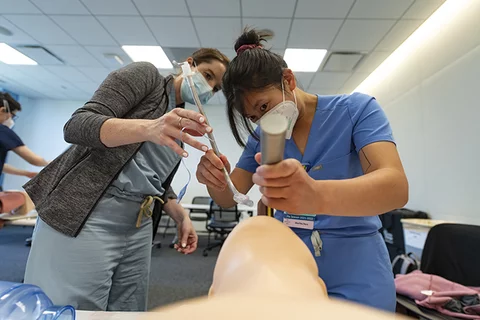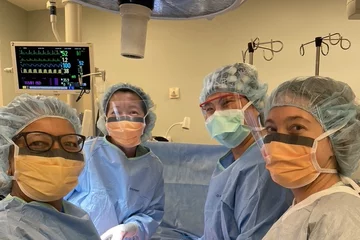Using Campus Meditation Resources to Improve Med School Life
Medical school is a demanding time for students, which is why health and overall well-being are so important. One way students can find this balance is through meditation, and UCLA offers a range of resources to help them navigate their academic careers in a healthy way.
Why Meditation?
Although it has been around for millennia, only recently have the benefits of meditation been studied. "There are many ways to practice meditation, but in general the goal is to achieve a state in which the mind is clear, relaxed and inwardly focused," says Aurora Reyes, MAEd, director of career development and well-being. "Meditation is believed to help relieve stress, lessen depression, lower blood pressure and improve sleep [while boosting] memory, mood and even social intelligence."
But meditation is also a practice in mindfulness; this means being present in whatever is happening around the person without judgment. As Reyes explains, mindfulness is "a way to turn off the autopilot we get stuck in as a result of our busy lives."
Meditation and mindfulness are great practices for medical students because they can be done anywhere at any time.
"Studies suggest that there is a high prevalence of depression and anxiety among medical students," Reyes admits. "Mindful meditation is effective in its ability to alter our relationship with what is happening at any given moment. We can enjoy life as it occurs, be fully engaged in activities and better cope with challenging or difficult events."
UCLA's Meditation Resources
This practice may be new or unfamiliar to many students, but as part of its commitment to keeping them healthy, UCLA has a host of resources to help people take advantage of the benefits of meditation. Sessions are offered free for students by the UCLA Mindful Awareness Research Center (MARC).
- Drop-in guided meditation sessions. These 30-minute sessions are offered in multiple locations around campus. They help participants learn the basics and how they apply to their normal routine.
- Weekly community practice. These sessions are for anyone who wants a deeper understanding of mindful meditation. Participants have a 30-minute guided meditation session, followed by a 20- to 30-minute lecture about mindfulness.
- Guided meditation podcasts. For students who prefer to try meditation on their own, MARC offers short, guided audio files of meditations for download.
"We hope our students can incorporate these resources into their lives and that these practices will contribute to their learning and overall well-being," Reyes says.
(Related Article: Staying Healthy in Medical School Takes Planning)




